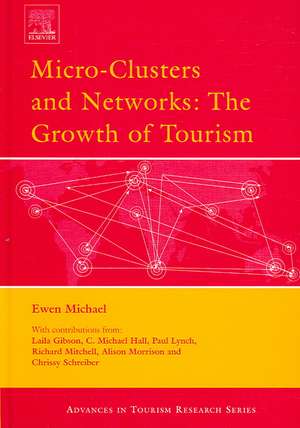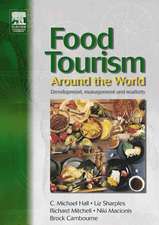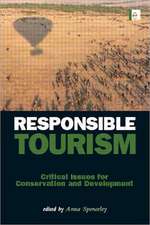Micro-Clusters and Networks: Routledge Advances in Tourism
Autor Ewen Michaelen Limba Engleză Hardback – 19 sep 2006
Microclusters and Networks provides a theoretical explanation of how and why micro-clusters come about, with chapters by specialist authors to illustrate examples of their practice in the real world; but it goes further to demonstrate not only why they work but also how community members interact to form successful clusters. The incorporation of networking theory provides the means to explain the role of local community interaction in delivering successful social outcomes. The analysis that is provided clearly has applications for many industries beyond the development of rural and regional tourism destinations.
Din seria Routledge Advances in Tourism
-
 Preț: 319.24 lei
Preț: 319.24 lei -
 Preț: 349.17 lei
Preț: 349.17 lei -
 Preț: 319.01 lei
Preț: 319.01 lei -
 Preț: 436.14 lei
Preț: 436.14 lei -
 Preț: 471.25 lei
Preț: 471.25 lei - 25%
 Preț: 828.48 lei
Preț: 828.48 lei - 18%
 Preț: 1000.30 lei
Preț: 1000.30 lei -
 Preț: 491.68 lei
Preț: 491.68 lei - 30%
 Preț: 848.55 lei
Preț: 848.55 lei -
 Preț: 413.72 lei
Preț: 413.72 lei -
 Preț: 439.85 lei
Preț: 439.85 lei - 18%
 Preț: 1062.26 lei
Preț: 1062.26 lei -
 Preț: 492.53 lei
Preț: 492.53 lei -
 Preț: 410.66 lei
Preț: 410.66 lei -
 Preț: 389.27 lei
Preț: 389.27 lei -
 Preț: 420.34 lei
Preț: 420.34 lei -
 Preț: 479.51 lei
Preț: 479.51 lei -
 Preț: 364.94 lei
Preț: 364.94 lei -
 Preț: 409.13 lei
Preț: 409.13 lei -
 Preț: 388.42 lei
Preț: 388.42 lei -
 Preț: 449.63 lei
Preț: 449.63 lei - 13%
 Preț: 309.58 lei
Preț: 309.58 lei - 60%
 Preț: 487.89 lei
Preț: 487.89 lei -
 Preț: 487.86 lei
Preț: 487.86 lei -
 Preț: 445.38 lei
Preț: 445.38 lei -
 Preț: 418.94 lei
Preț: 418.94 lei - 30%
 Preț: 845.69 lei
Preț: 845.69 lei - 18%
 Preț: 1061.93 lei
Preț: 1061.93 lei - 69%
 Preț: 445.64 lei
Preț: 445.64 lei - 62%
 Preț: 422.28 lei
Preț: 422.28 lei - 18%
 Preț: 1379.09 lei
Preț: 1379.09 lei - 55%
 Preț: 496.87 lei
Preț: 496.87 lei
Preț: 1001.84 lei
Preț vechi: 1221.75 lei
-18% Nou
Puncte Express: 1503
Preț estimativ în valută:
191.73€ • 199.43$ • 158.28£
191.73€ • 199.43$ • 158.28£
Carte tipărită la comandă
Livrare economică 14-28 aprilie
Preluare comenzi: 021 569.72.76
Specificații
ISBN-13: 9780080450964
ISBN-10: 0080450962
Pagini: 204
Dimensiuni: 156 x 234 x 20 mm
Greutate: 0.5 kg
Ediția:New.
Editura: Taylor & Francis
Colecția Routledge
Seria Routledge Advances in Tourism
Locul publicării:Oxford, United Kingdom
ISBN-10: 0080450962
Pagini: 204
Dimensiuni: 156 x 234 x 20 mm
Greutate: 0.5 kg
Ediția:New.
Editura: Taylor & Francis
Colecția Routledge
Seria Routledge Advances in Tourism
Locul publicării:Oxford, United Kingdom
Public țintă
Researchers in Tourism, Planning, Geography, Urban and Regional Studies. It will also be useful and substantive reference for students of tourism development, and a supplementary reference for students of economic development, regional planning and regional geography. This book will also be a useful a reference point for public sector planners in regional and municipal authorities concerned with tourism and the development of economic opportunities for rural/regional communities.Cuprins
Introduction (Ewen J. Michael); Issues In Regional Development (C. Michael Hall and Ewen J. Michael); Development And Cluster Theory (Ewen J. Michael); Micro-Clusters In Tourism (Ewen J. Michael); The Role Of Networks (Paul Lynch and Alison Morrison); Micro-Clusters: Antiques, Retailing And Business Practice (Ewen J. Michael); Wine Tourism Networks And Clusters – Co-Operation And Barriers In New Zealand (Richard Mitchell and Chrissy Schreiber); Networks: Comparing Community Experiences (Laila Gibson and Paul Lynch); A Path For Policy (C. Michael Hall and Ewen J. Michael); The Contribution Of The Micro-Cluster Approach (C. Michael Hall, Paul Lynch, Ewen J. Michael and Richard Mitchell ).
Notă biografică
La Trobe University, Victoria, Australia, Ewen J. Michael, Laila Gibson, C. Michael Hall, Paul Lynch, Richard Mitchell, Alison Morrison, Chrissy Schreiber
Karlstad University, Karlstad, Sweden,
Otaga University, Dunedin, New Zealand,
Strathclyde University, Glasgow, Scotland,
Otaga University, Dunedin, New Zealand,
Strathclyde University, Glasgow, Scotland,
Otaga University, Dunedin, New Zealand
Karlstad University, Karlstad, Sweden,
Otaga University, Dunedin, New Zealand,
Strathclyde University, Glasgow, Scotland,
Otaga University, Dunedin, New Zealand,
Strathclyde University, Glasgow, Scotland,
Otaga University, Dunedin, New Zealand
Descriere
This book introduces a new approach to the analysis and management of growth in small tourism markets for regional and rural locations. It recognizes from the outset that the vast bulk of the tourism industry’s product is delivered by small business enterprises and that many of these are located outside of metropolitan areas. Its central premise is that a myriad of small-scale clusters can provide an effective means to establish a local competitive advantage in tourism activities based on the resources of existing communities. The book brings together contemporary views of the potential of clustering theory to promote development in micro-markets, within the paradigm of competition, to create a new framework for regional development that might serve to enhance the growth of small-scale tourism destinations.
Microclusters and Networks provides a theoretical explanation of how and why micro-clusters come about, with chapters by specialist authors to illustrate examples of their practice in the real world; but it goes further to demonstrate not only why they work but also how community members interact to form successful clusters. The incorporation of networking theory provides the means to explain the role of local community interaction in delivering successful social outcomes. The analysis that is provided clearly has applications for many industries beyond the development of rural and regional tourism destinations.
Microclusters and Networks provides a theoretical explanation of how and why micro-clusters come about, with chapters by specialist authors to illustrate examples of their practice in the real world; but it goes further to demonstrate not only why they work but also how community members interact to form successful clusters. The incorporation of networking theory provides the means to explain the role of local community interaction in delivering successful social outcomes. The analysis that is provided clearly has applications for many industries beyond the development of rural and regional tourism destinations.








